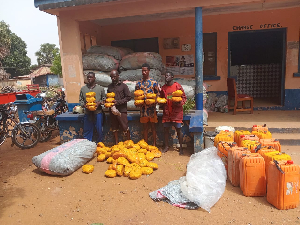The President of the American Chamber of Commerce in Ghana on Wednesday praised Ghana's major capital market, the Ghana Stock Exchange (GSE), saying that the overall return of 25 per cent for the last year was very good.
Mrs Victoria Cooper Enchia said, however, that even though interest rates had come down in recent times from between 30 and 35 per cent, it still remained high, making the ability to recover cost difficult.
She said the cedi has begun to slip again despite government's juggling efforts, "but this is not to say that the business community is working in a hopeless situation".
"On the contrary, the business community has overcome some of the economic difficulties and is operating in a sound environment. We do not want to lose the seemingly brilliant opportunities available in Ghana," Mrs Enchia said at a breakfast meeting between the American Chamber of Commerce and visiting US Secretary of Commerce, Mr Donald Evans,
Mr Evans is leading an 11-member business delegation for a two-day visit to Ghana to seek investments in the areas of medical technology, computer software, construction, environmental services, power generation and safety and security.
Mrs. Enchia said the Commerce Secretary's visit is aimed to take grounds for America business, promote and advocate business partnership between Ghanaian and America businessmen. This is to prove that the US remains serious about doing business in Africa, she added.
Mr. Alan Kyeremanteng, Ghana's Ambassador to the US, said the visit is one of a series of high level visits by distinguished US representatives of both the public and private sector to seek areas of investments in Ghana.
He described the visits as a very important anchor, which could promote trade as a critical component of government's efforts to create wealth, reduce poverty and generate investments in the country.
Mr Kyeremanteng observed that Ghana and the whole of Africa had contributed to the wealth of the developed countries and therefore, it was important for Ghana's representatives abroad to ensure that the wealth created outside is brought back.
"Unless we are able to bring some of the wealth created in the developed countries back to Africa, the journey over and across the ocean will be in vain."
Mr Kyeremangteng said the reasons for America's choice of Ghana, as a country of interest and for investment is evident in the political stability, strong economic performance, availability of well-trained and skilled labour and an improved judicial system and good infrastructure.
Mr Evans reiterated the thrust of his message for the visit, which is to emphasise that the US is committed to create the environment for free trade.
He said, however, that it was the job of the business community to translate that commitment into action. Mr Evans said the US would be opening a new commercial office in Accra to help strengthen business ties with Ghana.
The US foreign commercial service of the Department of Commerce now has 54 people working on the ground in Africa to find new business opportunities for American investors.
Commerce Secretary Evans noted that under free trade and democratic values, the government could do a lot by providing the legal and political framework, build public infrastructure.
"In fact, President Bush is seeking a 50 per cent increase in development assistance over the 10 billion dollars we now provide every year," he said.
"This is a remarkable period for Africa. We've seen action on a number of fronts such as the WTO meetings in Doha, the G-8 Summit last summer and the World Summit on Sustainable Development. All these efforts show how serious the world is about connecting Africa to the global economy."
Mr Evans said there are more than three billion people in the world living on less than two dollars a day with the largest number of them in Africa.
He said this is because there are not enough opportunities in the world and noted that it was the responsibility of governments to change the situation through the business community.
Mr Evans presented an award of excellence to Pioneer Food Cannery, a canned food processing company in Ghana. Mrs Enchia received a certificate of recognition.
GRi?/
Send your comments to viewpoint@ghanareview.com
Return to top
Stock Exchange elects chairman
Accra (Greater Accra) 14 November 2002- The Council (Board of Directors) of the Ghana Stock Exchange has elected Mr Jude Kofi Bucknor as the chairman for a term of two years (2002-2004).
A statement issued in Accra on Wednesday said the Council has also elected Mr John Percival Awuku Nyako as deputy chairman for the same period.
Mr Bucknor holds a BSc (Administration) degree from the University of Ghana, Legon and an MBA (Finance) degree from the Columbian University, New York.
Mr Bucknor who was managing Director of CAL Merchant Bank from 1997-2000, is currently the Chief Executive Officer of J.K. Bucknor and Associates, an Accra-based corporate finance advisory firm.
Mr Nyako holds a BSc Engineering degree from the Kwame Nkrumah University of Science and Technology (KNUST), Kumasi. He is a fellow of both the Ghana Institution of Engineers and the Ghana Institute of Management. Mr Nyako is currently the Managing Director of Aluworks Limited.
GRi?/
Send your comments to viewpoint@ghanareview.com
Return to top
Over ?6bn spent on Dagbon
Accra (Greater Accra) 14 November 2002 - Government had by the end of last October spent more than ?6bn on the Dagbon crisis which erupted in March this year.
Ernest Akubour Debrah, Acting Northern Regional Minister, said on Wednesday that the expenditure calculated so far was spent on security personnel made up of 29 officers an 395 men of the Ghana Armed Forces and 250 police personnel.
Other expenditures were on transportation, feeding and hotel accommodation for the Wuaku Commission in Sunyani, Tamale and Yendi, and for other visiting teams of assessors and cost of maintaining security for appointed officials in the wake of the crisis.
Debrah was speaking when he took his turn to speak on the development activities in the Northern Region at a media encounter dubbed: "Meet the Press" in Accra. The Ministry of Information and Presidential Affairs initiated the encounter, and the Volta, Brong Ahafo, Central, Western and the Eastern regions have already had their turns.
Debrah expressed worry over conflicts in the region and said there were other costs like the loss of human lives and property, personal, human and time costs. He noted that almost all the conflicts in the region occurred between January and June during the long dry season and said the greatest challenge to the region's development efforts was the instability and insecurity caused by the many conflicts.
"The low literacy rate in the region, coupled with the long period of non-economic activity, make the majority of the people gullible to any misinformation," Debrah said. "These together with ineffective policing may be the major causes of conflicts in the region."
The results of the chieftaincy, religious, ethnic and land conflicts had been loss of life and property, insecurity leading to the curtailment of economic activity, internal displacement of people, Debrah said. He said the conflicts, which are a drain on the nation's resources, also lead to social in-cohesion and drive investors away.
The Acting Northern Regional Minister, who is also the Minister for the Brong Ahafo Region, noted that aside the Yendi conflict in March, the Kpabuso-Mpaha religious conflict in West Gonja, the Bimbago ethnic conflict in East Mamprusi and the Bimbila chieftaincy disputes were also recorded in the same month.
He said the Bimbila crisis had been contained and security personnel had been deployed to ensure law and order. He said the only major crisis yet to be resolved in the region is the Yendi crisis.
Debrah said the Otumfuo Mediation Committee was working to reconcile the two factions in the Yendi crisis. The Acting Regional Minister added that he had been holding durbars with the chiefs and people of the area and stressing on unity for development.
"I have also had discussions with some youth groups and opinion leaders on the way forward in resolving the crises," he said. He added that the Regional Coordinating Council had also recently acquired airspace on Radio Savannah to constantly send peace messages to the public through non-governmental organizations. Debrah expressed the hope that peace would soon return to the area.
GRi?/
Send your comments to viewpoint@ghanareview.com
Return to top
Medical School to honour plastic surgeon
Accra (Greater Accra) 14 November 2002 - A Professorial Chair is to be endowed at the University of Ghana Medical School to be named after Professor Jack C. Mustarde to acknowledge his significant and unique contribution to the development of the Reconstructive Plastic Surgery in Ghana.
This will form part of activities to mark the 10th anniversary of the International Reconstructive Plastic Surgery (Ghana) Project, a statement from the British High Commission in Accra said on Wednesday.
Professor Mustarde is an eminent plastic surgeon in Scotland, now retired, whose personal vision and energy led to the creation of the project. The project has two plastic surgery centres in Accra and Kumasi headed by Dr Fabian Mork and Dr Pius Agbenorku respectively.
Professor Mustarde, 87, developed the idea for the International Reconstructive Plastic Surgery (Ghana) project in 1993. This was after spending three weeks in Ghana as an Adviser to a visiting team of surgeons and physicians who were performing plastic surgery operations in Accra and Kumasi in 1992 under the auspices of Rotary International.
The statement said over the years, nearly 30 specialist surgeons from Europe, principally the UK, have visited Ghana to support the Project's aims and to use their expertise to support their Ghanaian colleagues in treating Ghanaian patients, and others from West Africa, in need of specialist complex operations.
Support for the project has come from numerous sources including the UK, Japan, and many companies and private individuals, as well as the Government of Ghana.
The statement said to mark the anniversary, the British High Commissioner Dr Rod Pullen would hold a reception on November 14 for the surgeons and other Ghanaian and UK experts in the field and benefactors of the project.
It said His Excellency Isaac Osei, Ghana's High Commissioner to the UK, would host a similar reception in London for all those who have contributed to the success of the project in Ghana.
The centre in Accra alone has since its inception 10 years ago treated almost 30,000 patients of whom 2,500 were theatre cases. The project has over the years helped a number of Ghanaian medical practitioners develop expertise in plastic surgery, built and equipped a facility for their work and a 33-bed nurses' hostel at the Korle Bu Teaching Hospital.
GRi?/
Send your comments to viewpoint@ghanareview.com
Return to top
Northern Region faces Police personnel shortage
Accra (Greater Accra) 14 November 2002 - One policeman or woman attends to 2,857 people and covers 111 square kilometres in the Northern Region.
This situation could contribute to the tensions and insecurity in the region, as the police personnel are simply not enough, are overstretched and may be overwhelmed in times of conflict, Ernest Debrah, Acting Northern Regional Minister, said on Wednesday.
Speaking on good governance at a media encounter dubbed: "Meet the Press," initiated by the Ministry of Information and Presidential Affairs in Accra, Debrah said the judiciary also was facing a similar situation and seemed to be present only in Tamale, the regional capital.
"The High Court, the Regional Tribunal and the Circuit Court are the only ones operating in the region, while courts in the districts are practically non-existent mainly because there are no magistrates/judges and other judicial personnel," Debrah said.
He said it was not possible to increase the number of these personnel within the short term, but the government was committed to address the constraints to ensure good governance. He said when the government came to power in January 2001 last year there were only seven police vehicles located in Tamale with none in the districts.
Debrah said government had provided all the 13 districts, with the exception of Bimbila, with at least one vehicle each. Also more lawyers were being recruited and the district assemblies were providing residential accommodation to house the district magistrates.
Debrah stressed the need for a peaceful environment in the region to promote investment and asked people in the region to learn to dialogue and to rely on the country's legal system to resolve issues rather than resorting to violence.
"The way forward is peace and massive investment. I will therefore, want to use this forum to appeal to the elite from the two factions in the Dagbon State to re-examine their positions and roles and see whether they cannot let go their egos and contribute to peace in the wider interest of Dagbon. The people of Dagbon are looking up to them for leadership and direction," Debrah prayed.
He said the region's vast investment opportunities could only be exploited in an environment of peace and called for sustained efforts to create the right investment opportunities for massive movement of resources to the region for accelerated development.
Debrah, who is also the Brong Ahafo Regional Minister, said the Northern Region had good agricultural and natural resource characteristics, a good transport system from the south and a fast growing metropolis. He stated that apart from agriculture investment, opportunities existed also in agro-based and manufacturing industries, tourism and mining.
Debrah said total reserves of iron ore found in the Shieni Tatale area were estimated at 1,270 million metric tones with iron content between 30-45 per cent, adding that Bole, Damongo and West Mamprusi districts, had received offers for prospecting gold in their various areas.
Debrah said agriculture employed 75 per cent of the people in the region but was constrained with inadequate financial support, unreliable weather, low literacy rate, poorly developed and absence of infrastructure, high post harvest losses and poor extension services.
He said, to reduce the problem of water supply, government and its development partners, including non-governmental organizations, had constructed a number of dugout wells and dams.
Through the poverty alleviation fund and funds provided for women in agriculture by the Ministry of Women and Children's Affairs, a good number of farmers were able to obtain credits to farming, he added.
Debrah expressed concern over the fast approaching desert in the region and said the Regional Co-ordinating Council, in collaboration with Environmental Protection Agency (EPA), had put in several interventions to check environmental degradation.
These include the establishment of the Regional and District Environmental Management Committees in all the 13 districts of the region to advise the district assemblies on environmental issues and the existence of environmental task force to handle environmental issues.
Debrah said bushfires continued to destroy the environment and threaten human lives and noted that the enforcement of the Bushfire Law was a problem. He asked chiefs in the region to assist to enforce the law and arrest perpetrators.
Business News of Thursday, 14 November 2002
Source:
United States praises Ghana's stock market
Entertainment











